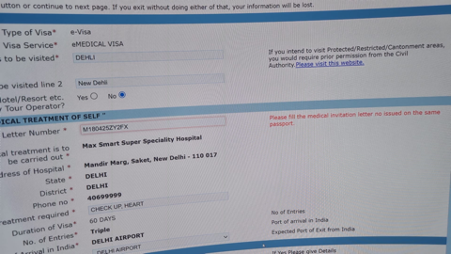
Should a hip replacement procedure become necessary, the surgeon will have to remove the affected portions of the hip and replace them with artificial joints that help eliminate pain and improve the hip’s function?
Hip replacement surgery would be an option if the pain comes in the way of routine activities and non-surgical treatments have not had the desired result or are no longer effective. Arthritis is the most common cause to go in for hip replacement.
Hip Replacement in India
Reasons for considering a hip replacement:
Potential conditions that can wear out the hip joint and hasten the need for a hip replacement include:
- Osteoarthritis: This form of arthritis is caused primarily by normal wear and tear. When osteoarthritis occurs, the cartilage that covers the bones and aids in smooth movements of the joints can no longer function as intended. Osteoarthritis causes pain and restricts motion.
Anti-inflammatory drugs, along with physical therapy, may provide relief. But, if these efforts do not yield the intended relief, the next step would be to consult an orthopedic surgeon.
- Rheumatoid arthritis: Rheumatoid arthritis is brought about by an overactive immune system. It is responsible for a type of inflammation that erodes the cartilage and, at times, the underlying bone, resulting in damaged and deformed joints.
- Osteonecrosis: If blood supply is deficient to the ball portion of the hip joint, the result may be a dislocation or fracture and may even lead to the bone collapsing.
Hip replacement may be the only available option worth considering if:
- The pain persists, despite medication to control it.
- The hip condition worsens when walking, even with an aid being used.
- The pain interferes with sleep.
- The ability to walk up or down stairs is hampered.
- Difficulty in arising from a seated position.
Anatomy of the hip:
The hip consists of a ball and socket joint. The ball can be found at the top of the thigh bone, and the socket is part of the pelvis. The ball moves in the socket, allowing the leg to move freely in all directions.
The hip joint connects the torso to the lower legs. The many functions of the hip joint are:
- Balance and support your upper body.
- Move your upper leg.
- Help take your body weight.
- Flex, extend, and rotate the leg.
- Enable both a back-and-forth and circular motion.
Common symptoms that signify problems with the hip joint include:
- Pain.
- Swelling.
- Limited range of motion.
The three options for hip replacement are:
- Total hip replacement: A surgeon will replace the entire hip with a prosthetic joint. Usually, most hip replacements fall into this category.
- Partial hip replacement: Partial hip replacements are quite uncommon. In this procedure, the surgeon replaces only a part of your hip. This procedure is usually done in the case of hip fractures or to remove a tumor.
- Hip resurfacing: Hip resurfacing is a form of hip replacement surgery that turns to the use of implants to ease any hip pain or stiffness caused by osteoarthritis. The implants are put in place of any damaged tissue and bone, allowing for more fluid movement.
Longevity of hip implants
The hip implant or hip replacement prosthesis is known to be effective for anything between 10 and 20 years and, in some cases, could last even longer. The longevity depends on the type of implant and the patient’s age. Eventually, a hip implant will need to be replaced as it has worn out over time. The procedure required in this case is known as hip revision surgery.
Activities to avoid after hip replacement surgery:
After the hip replacement surgery, it would be advisable to avoid placing any stress on the leg involved for at least the next 12 months. The list of actions to avoid includes bending forward at the waist and squatting.
Your therapist will share a list of guidelines and precautions to take while going about your routine activities. Remember to stick by your therapist’s recommendations to speed up your recovery. Even once the hip has healed, indulging in high-impact sports or any similar activity should be avoided.
There are a few simple measures that you can put into practice that will make your life easier when you return home. These include:
- Restrict usage of stairs and keep it to a minimum. Avoid climbing stairs more than once or twice a day.
- Make use of chairs that have a firm, straight back. Any chairs that recline are to be avoided.
- To reduce the chance of falling, keep away all rugs and keep rooms clutter-free.
- Use an elevated toilet seat, as it will keep you from putting stress on your hips.
Tips for maintaining hip health:
Healthy hips are essential for most routine activities that we tend to take for granted. These include sitting, standing, walking, bending, and just about every other activity. Any pain in the hips can impede your everyday activities. If need be, you may consult a specialist to diagnose and treat the pain.
However, if what you are experiencing are just the minor pains that accompany daily life, an active and healthy lifestyle can help keep these little aches and pains at bay.
Here are some ways in which you can be proactive about his health:
- Any excess weight placed on the hip region will exponentially increase the pain you feel, particularly if you have arthritis. If you’re overweight, it would help tremendously if you could shed some of that excess weight.
- A balanced diet will have a positive effect and help strengthen your bones. Including foods rich in Vitamin C will help boost the formation of collagen. Collagen has a vital role to play in lubricating the hip bones in their sockets, improving bone health, and helping avert fractures. Be sure to include anti-inflammatory foods such as dark leafy greens, fatty fish like salmon, extra-virgin oil, etc., in your diet.
- Even minimal exercise can help maintain the body’s muscle structure, strengthen bones, help keep your hips strong, and prevent injuries. Exercise regularly to keep your hips flexible. Swimming a few laps or a quick walk in the mornings will help.
- Pay heed to the signals your body sends out. Pain is a way your body is telling you that something is not right. If any exercise triggers more than the average amount of soreness, halt your exercise routine and consult your doctor before resuming the activity.
Hip Replacement Cost in India
The cost of hip replacement in India will depend on the kind of hip replacement surgery needed and the kind of implant to be used. The average hip replacement cost in India can vary between Rs. 2,50,000 (USD 3000) to Rs. 4,50,000 (USD 5500). Some of the other factors that have a direct effect on the cost of treating the hip are:
- Type and quality of implant used: The kind and quality of the hip implant to be used are significant factors determining the cost of hip replacement surgery. It is the orthopedic surgeon’s responsibility to narrow down the hip implant while considering factors like the degree of movement the patient requires, their current health condition, etc.
- Cost of hospitalization: The type of hospital room the patient prefers, duration of the stay, and choice of hospital will all have a direct bearing on the cost of hospitalization. The city you are getting treated in will also affect the price, as getting treated in metro cities will cost more when compared to smaller towns.
- Experience of the surgeon: As the patient would no doubt prefer an experienced orthopedic surgeon to perform the procedure, their experience, too, is a factor that will be a part of the cost incurred. Turning to an accomplished surgeon would mean a greater chance of success, and you would also be back on your feet that much sooner.
- Medication cost: Post-operative recovery may require some form of pain management. Helping to cope with the pain that comes with hip replacement surgery are several forms of medication, primarily anti-inflammatory drugs.
- Managing post-surgery complications: If the patient has any pre-existing conditions such as diabetes, hypertension, etc., the chances of post-operative complications can be higher. Some potential complications would be infections or internal hemorrhaging in which a short period of intensive care or blood transfusions would be required.
- Rehabilitation and physical therapy costs: After a successful hip replacement procedure, the patient would need extensive physiotherapy and rehabilitation to help regain mobility of the hip joint. The rehabilitation cost would depend on its duration and the kind of hip implant used.
- Insurance coverage: Having an insurance policy that covers all eventualities and treatment options when it comes to hip replacement will ease the patient’s financial obligation.
Top 10 best Hip Replacement hospitals in India
(The subheading provided by you has been highlighted as plagiarised)
When it comes to undergoing hip replacement surgery, selecting the appropriate facility that delivers optimal care and treatment is of utmost importance. Pinpointing the best hospital for hip replacement in India can be like searching for the proverbial needle in the haystack.
An orthopedic facility that consistently delivers high-quality, patient-centric care will automatically gain the recognition it deserves and will gain respect in the community. Some of the facilities that qualify for the title of best hip replacement hospital in India are:
- Primus Super Speciality Hospital, Chanakyapuri, New Delhi.
- Delhi Institute of Trauma & Orthopaedics, Kashmiri Gate, New Delhi.
- Sanar International Hospital, Golf Course Road, Gurugram.
- Cygnus Hospitals, Rama Vihar, Sector 38, New Delhi.
- Metro Hospitals & Heart Institute, Sector-12, Noida.
- Artemis Hospitals, Sector 51, Gurugram.
- BLK-Max Super Speciality Hospital, Pusa Road, Rajendra Place, New Delhi.
- Fortis Malar Hospital, Gandhi Nagar, Chennai
- Jaslok Hospital, Tardeo, Mumbai.
- Sparsh Hospital, Infantry Road, Bengaluru
Top 10 best Hip Replacement Doctors in India
India is known for having several highly skilled doctors across all specialties, and the field of orthopedics is no exception. There are plenty of surgeons who specialize in hip replacement affiliated with renowned medical institutions across the country.
Of these, some of the best doctors for hip replacement in India worth considering for their expertise and years of experience are:
- Dr. Raju Vaishya, Apollo Hospitals, New Delhi.
- Dr. Vivek Mittal, Fortis Hospital, New Delhi.
- Dr. Raman Kant Aggarwal, Fortis Escorts Heart Institute & Research Centre, Okhla.
- Dr. B.K. Singh, Artemis Hospitals, Gurugram.
- Dr. Ashok Dhar, Fortis Escorts Hospital, Faridabad.
- Dr. JBS Jaggi, Max Hospital, Gurugram.
- Dr. Akhilesh Yadav, Max Multi Speciality Hospital, Noida
- Dr. Ashish Philip Zachariah, Aster Medcity, Bengaluru.
- Dr. Sharan Shivaraj Patil, Sparsh Hospital, Bengaluru.
- Dr. Arun Kannan, Apollo Hospital, Chennai.
My Med Trip is a leading healthcare and medical tourism company in India. We are offering complete medical tourism services in India for foreign patients. We also provide free medical consulting with appointments with the best hospitals and doctors in India. Our main medical tourism services are kidney transplant, liver transplant, liver cancer treatment in India, best kidney transplant hospital, shoulder replacement in India, brain tumor surgery cost in India, knee surgery, top heart hospital in India, cancer treatment, bone marrow transplant in India, hip replacement, best cardiologist in India etc.








